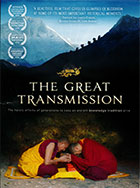
The Great Transmission 2016
Distributed by Guna Foundation, 2018 Allston Way, Berkeley, CA 94704; 510-809-1543
Produced by Barry Schieber
Directed by Pema Gellek
DVD , color, 55 min.
College - General Adult
Asia, Buddhism, Religion
Date Entered: 11/30/2016
Reviewed by Mary Northrup, Metropolitan Community College-Maple Woods, Kansas City, MissouriUsing beautiful and stirring visuals, this film depicts how a small group of people saved the sacred texts of the Buddhist tradition from destruction. History and religion intertwine with the portrayal of Buddha’s life and teaching, followed by the transmission of this knowledge as his disciples shared that knowledge throughout the world.
Narrated by actor Michael Nouri, the film also features experts in the subject, such as monks, lay people involved in the project of saving the texts, professors, researchers, and more. While the words are interesting and will add to the viewers’ understanding, it is the visuals that are the prize of this film: towering shelves of manuscripts, carved Buddhas, altars, people meditating, waterfalls, forests, mountains, caves, old monks, young monks, nuns, and printing presses. Some graphics are used, in maps and some CGI images showing people in historical scenes.
The scope of Buddhism’s spread is represented in the disciples’ travels, long shots in various landscapes. The colors range from the bright red of artwork to the brown of deserts.
While the film covers the history of Buddhism from its beginnings, much of it concerns the invasion of Tibet by China in the 1950s, and how the Tibetan texts were saved. Moving between Asia and the United States, the action then shifts to California, where the Yeshe De Project produces books in order to distribute Buddhist texts to those who wish to study them.
Educational and artistic, The Great Transmission is sweeping yet personal, majestic yet intimate. From the beautiful wide shots of nature to the up-close focus on monks’ faces, this presentation of history and culture may inspire and educate viewers. The music reflects the culture through voice and instrument.
College classes in Asian history and world religions may find this most useful. Public library patrons who are interested in Buddhism, Tibet, and publishing may also be potential viewers.
Awards
- Winner, Silver Palm Award, Mexico International Film Festival 2016
- Official Selection, Buddhist Film Festival Europe 2016
- Official Selection, Maui Film Festival 2016
- Official Selection, Albuquerque Film & Music Experience 2016